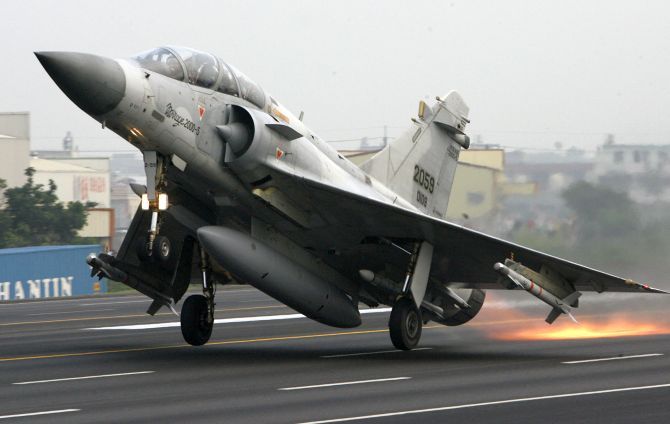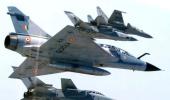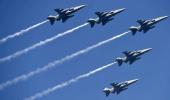In the early hours of Tuesday, 12 Indian Air Force Mirage-2000 fighter jets entered Pakistani airspace and dropped 1,000-kg laser-guided bombs on Jaish-e-Mohammed terror launch pads across the Line of Control.

The Mirage 2000 aircraft used in Tuesday’s strike on Jaish-e-Mohammed terror camp in Pakistan was chosen because of its ability to hit long-range targets with “pin-point” accuracy and drop a range of bombs and missiles including laser-guided ones, sources said.
India inducted the Mirage jets some 30 years ago but the upgraded version is a “very potent platform.... it is a game changer in the air”, said a former Mirage pilot.
He said the upgraded Mirage is a generation ahead of the older version and about half a generation ahead of the Sukhoi Su30MKI, which was a second choice for the attack on the camp.
But Mirage might have been selected because of its “proven capability.” It was also used in Kargil for similar strikes. “Mirage squadrons train day in and day out for this kind of mission”, said the pilot, speaking on condition of anonymity because of the sensitivity of the subject.
Also, the Russian Su30 is slower in the air with a maximum speed of 2,120 kmph or twice the speed of sound, Mach 2. The French-designed Mirage can travel at more than twice the speed of sound, or at Mach 2.2 (2,336 kmph).
“And the best thing is, it is a joy to fly”, said the pilot.
Su30 is also heavier, which makes it less nimble than the Mirage, a distinctive aircraft with its delta wings. The fighter jets have been and are being upgraded at a cost of around Rs 20,000 crore at HAL. The multi-role, single engine jet is usually a single-pilot fighter with a variable flying range depending on its payload, the altitude it is flying at and whether it is carrying additional, external fuel tanks.
In any case, the Mirage can easily fly to Balakot and return home, even if it not refuelled in mid air, which it is capable of. The Mirage can carry three additional fuel tanks -- two each under the wings and one on the belly.
It is capable of flying at an altitude of 59,000 ft (17km). A commercial jetliner usually flies at 35,000 to 40,000 feet.
Indian Air Force sources said the aircraft was preferred as it is capable of long-range engagement of targets and the assessment was that it can record 100 per cent success rate.
The Mirage also is fitted with the state-of-the art Thales RDY 2 radar system, which has a better look down and look up capabilities. It also can track more objects at the same time and has a longer range.
The Mirage comes with a fly-by-wire flight control system with a Sextant VE-130 HUD, or Head Up Display that allows the pilot to see all the flight, navigation, target and weapons information in a virtual display array on a screen just in front of the windshield.
However, in an operation like this, the pilot is most likely to be looking at the display panel below and not so much on the HUD.
India currently has around three squadrons of Mirage 2000 fighter jets manufactured by Hindustan Aeronautics Limited under licence from French aerospace major Dassault Aviation, which also will deliver Rafale fighters to India soon. The Mirage squadrons are based in Gwalior.
The sources said the Mirage 2000 multi-role aircraft was chosen for the strike for its capability to hit targets with “pin-point” accuracy. A number of other assets and platforms of the IAF were also used in the operation, first inside Pakistan after the 1971 Indo-Pak war.
The sources said India will have a much wider choice of aircraft to carry out precision strikes when Rafale jets are inducted into the IAF as they are capable of hitting targets at longer range. India is procuring 36 Rafale jets at a cost of Rs 58,000 crore and the first aircraft is scheduled to be delivered in September.
It is not clear whether the fleet of Mirage 2000s flew directly from Gwalior or they took off from other bases to carry out the strike.
The Mirage 2000 was first commissioned in 1985, when it was given the name Vajra, or thunderbolt. India initially bought 36 single-seater Mirage 2000 and 4 twin-seater Mirage 2000 after Pakistan bought F-16 fighters manufactured by Lockheed.











 © 2025
© 2025